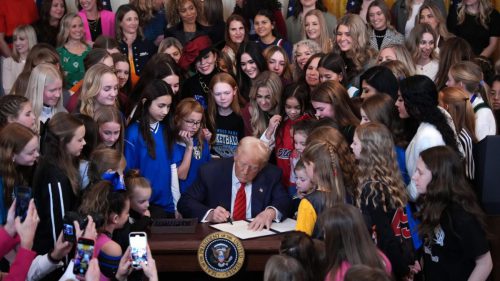


For years, we’ve been hearing that one side of the political aisle is on “the right side of history.” But history doesn’t seem to be cooperating.
 For at least a decade, Millennials have been stereotyped as lazy, entitled, and stuck on social media. While that may not be entirely fair, they are notoriously liberal, overwhelmingly supporting left-leaning candidates and favoring policies like nationalized healthcare and same-sex “marriage.”
For at least a decade, Millennials have been stereotyped as lazy, entitled, and stuck on social media. While that may not be entirely fair, they are notoriously liberal, overwhelmingly supporting left-leaning candidates and favoring policies like nationalized healthcare and same-sex “marriage.”
But Millennials are also getting old—relatively speaking. The first are now reaching the ripe old age of thirty-five! And sometime between 1995 and 2000, the millennial generation ended, or at least stopped being born, and a new generation began.
Members of “Generation Z” are now beginning to graduate high school, and 2016 was the first time any of them were old enough to vote. At seventy million and counting, they’re also about to outnumber their predecessors.
So, what’s so intriguing about this new brood? Well, according to a growing body of research, they may be, by certain measures, the most conservative generation since World War II—more than Millennials, Generation Xers and even the Baby-Boomers.
Millennials were raised in a time of roaring prosperity, when video cassettes were a bigger influence than digital technology, and many came of age before the age of radical Islamic terror. Gen Z kids, by contrast, are “digital natives.” They’ve never known life without the Internet, and have grown up surrounded by instant access to the world’s harsh realities on their smart phones.
These young people are products of conflict and recession. They can only remember a news cycle “marred by economic stress, rising student debt… and war overseas.” As a result, they’ve taken on what one team of Goldman-Sachs analysts called a “more pragmatic” and conservative outlook on the world.
Of course, generalizations at this stage are very early and very subject to development. But according to polling in the wake of the 2016 election, Gen Z Americans didn’t vote like their Millennial predecessors. Eight out of ten of these kids identify themselves as “fiscally conservative,” and they prefer saving to spending—at rates not seen since the Silent Generation.
And get this: According to one British study conducted by global consultancy firm, The Guild, almost sixty percent of Gen Z respondents in the U.K. described their views on “same-sex marriage, transgender rights and marijuana legalization” as “conservative” or “moderate,” compared with a whopping 83% of Millennials who called themselves “quite” or “very liberal” on these issues. The Gen Z participants were even ten times more likely than Millennials to dislike tattoos and body piercings!
These are good trends, but these students still need discipleship and catechesis. A tendency toward traditional values, by itself, means nothing unless those who believe in revealed Truth, the Gospel, the natural family, and political and religious liberty step forward and train the next generation to articulate and live out these truths.
What is clear from this emerging data about the young is that they don’t fit neatly into rhetoric about the “right side of history.” As Columbia University sociologist, Musa Al-Gharbi writes, trends like this are deeply troubling for those so recently crowing that the future belonged to one political party.
No one knows what the future holds, except the One Who holds the future! And the fact that so many were apparently wrong about the right side of history is just another reminder that He alone is God, Whom the Psalmist called “faithful throughout all generations.”
Further Reading and Information
Kids These Days: Generation Z Most Conservative Since WWII?
Eric has highlighted some interesting and surprising statistics for the post-Millennial generation. These statistics show that there is a great opportunity for believers to be engaged in discipling and training this younger age-group. For even more details about Generation Z, check out the resources linked below.
Find a BreakPoint radio station in your area–Click here.
Have a Follow-up Question?
Want to dig deeper?
If you want to challenge yourself as many others have done, sign up below.














